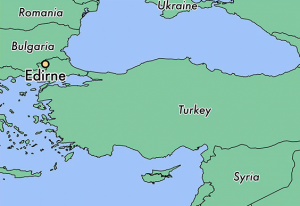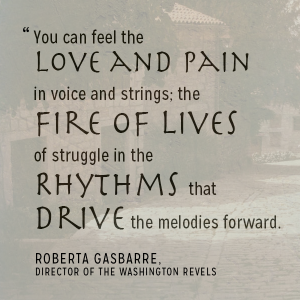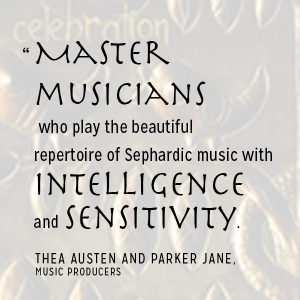 Sephardic music has always been a vocal repertoire, but since the start of our trio we have looked for songs that lend themselves to instrumental renditions, and we love to create medleys that highlight haunting (or energetic) tunes, adding our own harmonic structures; this medley is no exception. All three songs can be found Chants Judeo Espangols, a treasure house we are constantly exploring to expand our repertoire. “Trayen ala Ninya” (They Bring a Young Woman) comes from Edirne, in western Thrace, Turkey, near the border with Greece and Bulgaria. Once a thriving center of Jewish activity and commerce, the community has dwindled significantly since World War II, but evidence of Jewish presence dates back at least two thousand years. Edirne was formerly called Adrianople, named for the Roman emperor Hadrian in the year 125.
Sephardic music has always been a vocal repertoire, but since the start of our trio we have looked for songs that lend themselves to instrumental renditions, and we love to create medleys that highlight haunting (or energetic) tunes, adding our own harmonic structures; this medley is no exception. All three songs can be found Chants Judeo Espangols, a treasure house we are constantly exploring to expand our repertoire. “Trayen ala Ninya” (They Bring a Young Woman) comes from Edirne, in western Thrace, Turkey, near the border with Greece and Bulgaria. Once a thriving center of Jewish activity and commerce, the community has dwindled significantly since World War II, but evidence of Jewish presence dates back at least two thousand years. Edirne was formerly called Adrianople, named for the Roman emperor Hadrian in the year 125.
“Esta Montanya” is a good example of a song that has many variants that do not relate to one another melodically (and sometimes textually), despite having the same name. Levy attributes this one to a source in Jerusalem; you can hear a completely different version from Turkey on our second CD, “Kaminos,” and many more on YouTube, and find it in various anthologies of Sephardic songs.
When we learned “Madres Amargadas” (Anguished Mothers) and performed it for the first time, we heard people in the audience humming along. We found out that there is an Israeli song from the 1948 War of Independence that addresses the sacrifices made by Israeli mothers who lost children in the struggle. But the song has a longer history, and thanks to our friend Daphna Mor, the Israeli-born, New York City-based musician, we learned that the song’s origins probably lie in World War II Russia; it was composed in 1943, lyrics by Pioter Mamaychuck, melody by Leonid Shokhin. There are also versions in Ukrainian, Yiddish, and Hebrew, in addition to Levy’s version, recorded here, which is from Jerusalem with lyrics in Ladino. All of them share the same message about the pain and joy of sacrificing lives for the cause of freedom (usually by partisans). Tina, Pontic lyra; Howard, lute.
Here are some links to other versions:
- Russian: https://www.youtube.com/watch?v=wNNgUUgHtgg
- Hebrew: https://www.youtube.com/watch?v=GMHT42fNLbk
- Yiddish: https://www.youtube.com/watch?time_continue=56&v=O4ySX3gCfYw (sung by Theodore Bikel, with Daniel Kempin, guitar)
- Mizrahi: https://www.youtube.com/watch?v=bzREmHlPadc
- Ukranian: https://www.youtube.com/watch?time_continue=35&v=koEAfCDvb2g
For a whole article in Hebrew about this song, go here:




